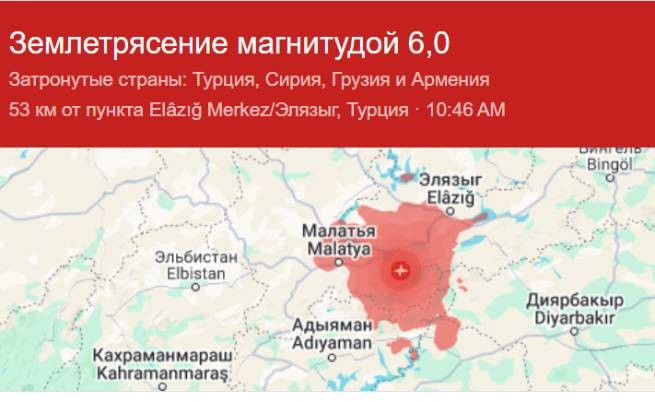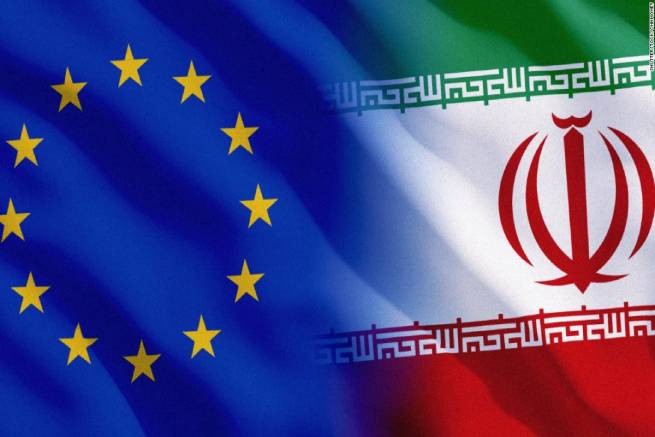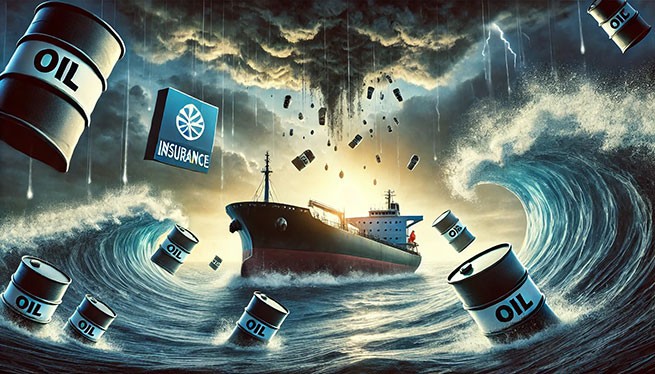Western insurers are losing control of Russian oiland Asia fills the vacuum. Why did Asian insurers win and what does this mean for the global market?
Sanctions of 2022, as usual in major events, have begun from Russian oil. And although they were considered one of the most severe measures of economic discipline, the consequences for the international insurance market were much more complex than expected.
Western insurers are serious guys
Lloyd's of London and their valiant “P&I clubs” clenched their cheekbones over their ledgers when great power governments decided it was time for Russia to pinch its wings. Insurance for Russian oil transportation? No way. A ceiling of $60 per barrel rose on the horizon, and behind it a series of confused insurers who hastened to quit their craft and step away from business. Everyone pretended that this was how it should be.
Against this background, Russia acted as befits a person who was kicked out of the door of a good club: it found its own way to return to the game. If you cannot get insurance abroad, you can create it within the country. This is how it appeared “Russian National Reinsurance Company (RNRP)”. RNPK took on the role of a native savior for Russian tankers. The assets, of course, are more modest than those of their Western colleagues, but enough for business – about $10 billion for risk reinsurance. Also involved in the case was Sovcomflot, a state-owned player that owns more than a hundred ships. Each of them, as it turned out, can and should be insured, even if you have to do it yourself.
But self-insurance is not everything. There was room on the global stage for a new player: Asian insurers such as China P&I Club cleverly inserted themselves into this vacuum. They quickly realized that Western insurers, playing by the rules of sanctions, had left some rather attractive pieces of the pie on the table. Russia still exports millions of barrels of oil per day, and if the West is no longer willing to insure this cargo, then there will be someone who is willing to take the risk. China and India have become important partners, buying millions of barrels of oil from Russia. With every tanker sent south or east, this new alliance became stronger.
Asia sat down at the insurance gaming table
The West, realizing that a piece of the pie had floated away, could only sigh heavily. Lloyd's, of course, was still considered the gold standard in the market, but every lost tanker left a bitter aftertaste. The Chinese insurance market has been growing, albeit at a modest pace. If China is willing to insure Russian cargo, why would Western companies risk their reputation by refusing such deals? But the real problems weren't just reputation.
The emergence of a parallel marketrun by Russian and Asian insurers, posed a deeper threat to the entire international insurance system. This new market, free from obligations to international regulators, has become a platform for what in some circles is called the “shadow fleet.” Vessels with dubious registrations and even more dubious insurance set sail without complying with international regulations.
Russia began to actively develop its insurance market back in 2016, when the Russian National Reinsurance Company (RNRP) was created. At that time, no one suspected that this structure would in the future become a key element in the new economic reality, when international players curtailed their services. Already in 2022, after the introduction of sanctions and the departure of Western insurers, RNPK took on an important role, reinsuring the risks of Russian ships, especially in the field of oil transportation.
In addition to the creation of RNPK in 2016, Sovcomflot, the largest state-owned shipping company, played an important role in the development of the Russian insurance market. Under the conditions of sanctions, when Western insurers began to leave the market, Sovcomflot became one of the first Russian companies to apply a self-insurance policy for its vessels. Operating a fleet of more than 130 tankers and icebreakers, Sovcomflot has assumed responsibility for insuring oil and gas shipments, especially along strategic routes such as the Northern Sea Route. This was an important step in the formation of an independent Russian insurance sector, which is increasingly replacing lost Western mechanisms.
Finding themselves outside Western rules, this shadow fleet created its own. Each insured tanker passing through the Northern Sea Route was a step into a new game, where the cost of insurance could be 30-40% higher, but who talked about this when the very fact that the goods are moving is important? And he went – to China, to India, through the Arctic ice and southern seas. In 2023 (it’s still October, the year has not yet ended), when 34 million tons of cargo were transported through the Northern Sea Route, it became clear that this route is no longer just an alternative.
Now the question is what to do with this Western insurers. Losing market share is not a good thing, especially when that share was a significant portion of the global marine insurance industry. The head of one of the largest “P&I clubs” sighed quietly, looking at the numbers: millions of barrels of oil were flowing to Asia under insurance policies that he never approved. Western players have lost control over Russian transportation – control that previously seemed unshakable.
So, what is the price of this risk for the Western whales of the insurance business? Until 2022, players such as Lloyd's of London had a near-monopoly position, covering 95% of all international vessels through their P&I clubs. Russia annually exported about 4.7 million barrels of oil per day, much of which came by sea. Let's roughly estimate: if each maritime shipment is insured for $5-10 million (depending on the risk), this is already billions of dollars in insurance premiums that Western companies lost every year.
But then it got worse.
Under sanctions, Western insurers quickly reduced their presence in this market. Lloyd's and leading P&I clubs abandoned the Russian client, just like a fireman fleeing a burning building. Only this time the flames did not destroy the market – they simply illuminated it for those who were ready to take this gold. As a result, according to some estimates, Western companies have already lost up to 30% of premiums associated with Russian maritime transportation, which in monetary terms amounts to $3-4 billion per year. And with each tanker leaving, this hole in the budget continues to grow.
Now let's look at the Asian prospects. China, India and other players have not only filled the vacuum; they have begun to lay the foundation for something bigger. Chinese insurance companies such as “China P&I Club” ready to take risks that Western insurers now consider toxic. While China still controls only 10% of the global marine insurance market, its share continues to grow. Moreover, the Northern Sea Route, an Arctic route that opens up new opportunities, looms on the horizon. And the Chinese understand that every premium insured on this route costs more than a simple passage through the Suez Canal.
Estimates show that Asian companies could double their share in the next 5-10 years, increasing their presence to 20% of the global market. For players like Lloyd's, this is a loss of several more billion dollars annually. If in 2023 China and India insured Russian oil for $1.5-2 billion, then this figure will grow every year.
If you factor in the Northern Sea Route and increased trade through the region, Asian insurers could control $5-7 billion in premiums in just a few years.
Now about the problems of the world's fat cats.
Firstly, reputation. Once the Chinese, Indians and others start creating more efficient insurance mechanisms, international players will lose not only money, but also the trust of their clients. How would you feel if your partner of many years, with whom you earned millions, suddenly left you to fend for yourself? This is exactly how Russian carriers feel now. And every new contract they enter into with Asian insurers is a nail in the coffin of old relationships.
Secondly, parallel markets. Western insurers are losing control not only over Russian exports, but also over entire routes. The Shadow Fleet, which no one really talked about until 2022, now plays by its own rules. Here the insurance may be minimal, but it is still there. These ships, often old and almost rusty, go where Western companies are already afraid to look. And they earn money – albeit on little things, but constantly.
What awaits the world's great insurers
If they do not reconsider their strategy and start looking for loopholes to return to the Russian market (even through Asian partners), their losses will continue to grow. And when China controls 20% of the market, Asian companies will become more than just a temporary solution for Russian oil – they will grow into a full-fledged competitor for Western giants
Clients may begin to wonder: “Why pay more at Lloyd's if the Chinese offer the same thing cheaper and with less risk of circumventing sanctions?”
Western insurance companies find themselves at a crossroads.
Losses already amount to $3-4 billion a year, and unless action is taken, this figure will continue to grow. Their reputation, the vulnerable part of their business, is at risk. If customers begin to flock to Asian insurers in large numbers, international giants will have to fight not only to regain their positions, but also to regain the trust of those they once served.
The world of insurance has changed. The rules of the game are now dictated not by those who sit in London or New York, but by those who are ready to take risks and move forward, despite obstacles.
Author's opinion: For some reason I remembered school. First, like a high school student, you slap the small kids on the back of the head and allow them to stand next to them. But time passes, and these little people are already giving a slap on the head to those who considered themselves the king of the hill or the coolest in school. So it is here. At first, Asia was the backyard of a large corporation. And now these corporations are becoming… Name yourself who.







More Stories
Gold prices remain at record levels as bond prices fall and dollar rises
Scientists have determined where the coronavirus came from (video)
BRICS considers Turkey an unreliable candidate for membership